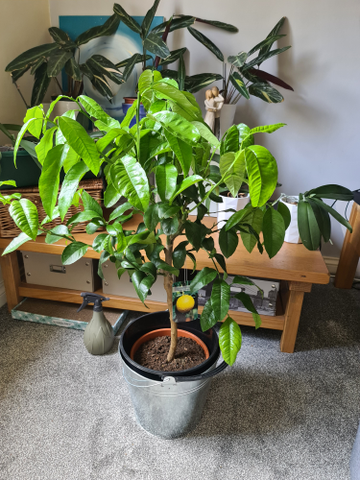Bergamot Tree
In stock


- Top quality 6 year old trees
- Produce fragrant flowers in spring and the highly prized bergamot fruits in mid-Winter
- Delivered gift wrapped and boxed with a handwritten greeting card
We're delighted to have these popular citrus trees back in for the new season. They are lovely strong 6 year old trees with a good head of foliage and we expect them to start to flower again over the next few weeks.
A slightly more unusual variety of citrus, one of these trees will make a really special gift for a citrus collector or for someone who likes to grow something a little bit different.
Like all citrus trees, Bergamot trees like sunlight so in the winter months choose a bright spot next to a large window or patio doors. In the summer months, citrus trees look great on a sheltered patio but rest assured all our plants come with full care guides on positioning and long term care.
We'll post some new pictures as soon as we can.
Our unusual Citrus Bergamot Tree / Bergamot plant (Citrus bergamia) are also known as Bergamot Lemon or Orange Bergamot and are prized for their fragrant leaves as well as their fruit, making them a fantastic gift for a citrus collector or chef. Our Bergamot trees are most famous for contributing the flavour of Earl Grey tea where bergamot oil or bergamot rind is added to the tea blend for that special citrus flavour. The Bergamot Tree are thought to be a hybrid between a lemon and bitter orange. With the right conditions, your Bergamot plant will produce yellow fruit the size of an orange when ripe. .
 4.9/ 5
42 reviews
4.9/ 5
42 reviews






Great , genuine product

Perfect!!

Looking forward to using this lovely plant.

Unique tree that was in fabulous condition on arrival

Healthy plant, you get what you it for!

Very healthy plant. Pleased.

VERY FINE SPECIMEN IN SUPERB CONDITION

Beautiful Bergamot tree with small fruits

Arrived in beautiful condition

Beautiful tree - free decorative pot and great support from them.

These instructions are sent with the plant gift
These unusual citrus trees are the true Citrus bergamia used to flavour Earl Grey Tea and make a lovely feature with heavily perfumed flowers and unusual drop-shaped fruits.
Citrus trees need lots of light. A conservatory is ideal, but they will also be happy near a window in a cool, bright room. In the summer and autumn, your citrus will thrive outdoors in full sun or partial shade. However, these trees are not hardy and will need to come inside as soon as the outdoor temperatures are near 5 degrees Celsius. When indoors, try to keep your plant away from cold draughts and any heating source.
Citrus are best kept in small pots here in the UK, they will need to be monitored regularly to check when the topsoil is dry. It is best not to have them on a routine water and let them tell you when they are next ready for a drink. When the topsoil is bone dry, remove the pot from the outer pot cover. Water thoroughly from the top until excess water drains right through the pot and out of the bottom and never leave your plant sitting in water. Sometimes if the soil is very compact this may take several waterings and is easiest to do in a kitchen sink. In the winter you should expect to water thoroughly still, making sure to soak the soil, but you might only need to do this once from anything between 1 to 4 weeks, depending on how quickly the soil dries out. In the summer months you may need to water every other day, but do not stand your plant in water. Don't worry if the soil feels dry between waterings, but if the leaves start to droop or curl you know it is thirsty, so water straight away. If you are having gradual leaf drop where you have a few leaves falling off each day, your plant is being overwatered.
In the summer, citrus trees will benefit from summer citrus feed every week to encourage growth, We use our Summer citrus fertiliser from March until the end of September. Through winter, from October until the end of February, we use the winter citrus fertiliser every time we water.
Citrus grow quite slowly; if you need to, repot in the spring only going up 1 pot size using a fast-draining compost suitable for container plants. As a general rule, citrus tend to produce flowers in late spring followed by small green fruits that can take 10 months or more to fully ripen. However, in this country, many varieties don’t follow a strict season and can fruit or flower at any point during the year.
Problem Solving
Citrus trees are not the easiest of plants but they are very rewarding. Look out for signs of trouble and try to treat problems early. The most common problem is leaves dropping due to over or under-watering. If leaves are crisp when they drop, this is due to underwatering; if they are leathery the chances are it has been over-watered. A return to a regular and thorough watering routine should lead to recovery.
If new growth is very light in colour or has mottled markings your plant may be lacking trace elements. A good dose of citrus feed should soon green up the leaves.
Our citrus trees are grown in a pesticide-free environment. In the unlikely event that you find pests, e.g. aphids, these can be removed by hand or with a soap and water spray. Check our recommended organic plant pest treatment for other pests here
We also have several pages and a video on more detailed citrus care here











